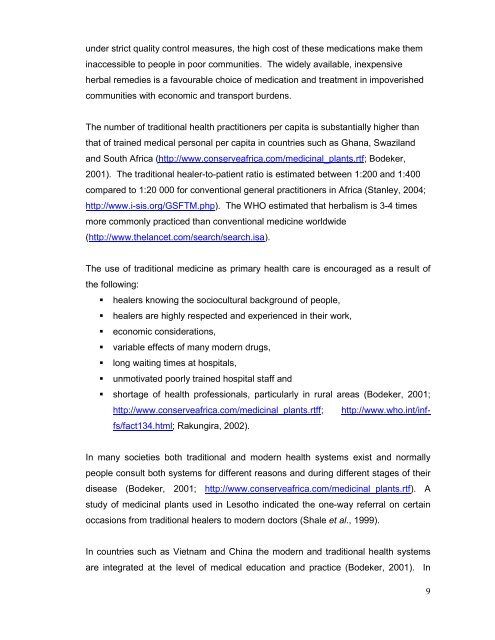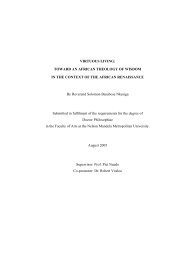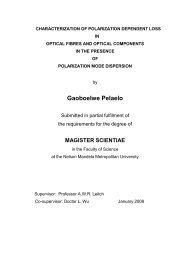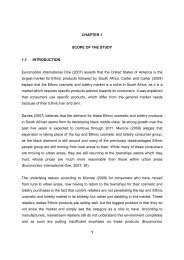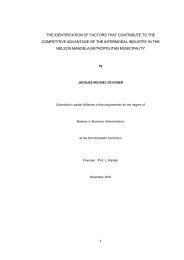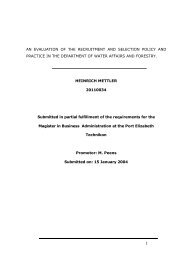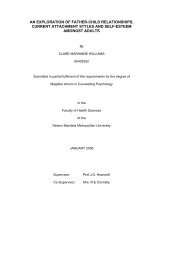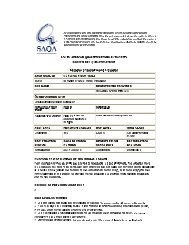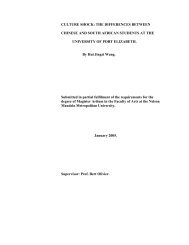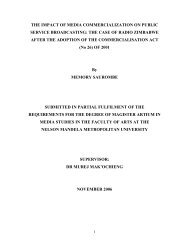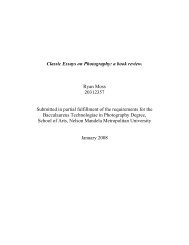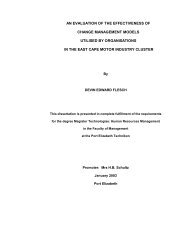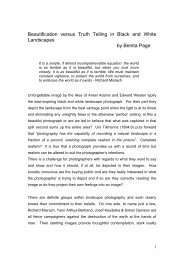an investigation into the antibacterial activities of medicinal plants ...
an investigation into the antibacterial activities of medicinal plants ...
an investigation into the antibacterial activities of medicinal plants ...
You also want an ePaper? Increase the reach of your titles
YUMPU automatically turns print PDFs into web optimized ePapers that Google loves.
under strict quality control measures, <strong>the</strong> high cost <strong>of</strong> <strong>the</strong>se medications make <strong>the</strong>m<br />
inaccessible to people in poor communities. The widely available, inexpensive<br />
herbal remedies is a favourable choice <strong>of</strong> medication <strong>an</strong>d treatment in impoverished<br />
communities with economic <strong>an</strong>d tr<strong>an</strong>sport burdens.<br />
The number <strong>of</strong> traditional health practitioners per capita is subst<strong>an</strong>tially higher th<strong>an</strong><br />
that <strong>of</strong> trained medical personal per capita in countries such as Gh<strong>an</strong>a, Swazil<strong>an</strong>d<br />
<strong>an</strong>d South Africa (http://www.conserveafrica.com/<strong>medicinal</strong>_pl<strong>an</strong>ts.rtf; Bodeker,<br />
2001). The traditional healer-to-patient ratio is estimated between 1:200 <strong>an</strong>d 1:400<br />
compared to 1:20 000 for conventional general practitioners in Africa (St<strong>an</strong>ley, 2004;<br />
http://www.i-sis.org/GSFTM.php). The WHO estimated that herbalism is 3-4 times<br />
more commonly practiced th<strong>an</strong> conventional medicine worldwide<br />
(http://www.<strong>the</strong>l<strong>an</strong>cet.com/search/search.isa).<br />
The use <strong>of</strong> traditional medicine as primary health care is encouraged as a result <strong>of</strong><br />
<strong>the</strong> following:<br />
healers knowing <strong>the</strong> sociocultural background <strong>of</strong> people,<br />
healers are highly respected <strong>an</strong>d experienced in <strong>the</strong>ir work,<br />
economic considerations,<br />
variable effects <strong>of</strong> m<strong>an</strong>y modern drugs,<br />
long waiting times at hospitals,<br />
unmotivated poorly trained hospital staff <strong>an</strong>d<br />
shortage <strong>of</strong> health pr<strong>of</strong>essionals, particularly in rural areas (Bodeker, 2001;<br />
http://www.conserveafrica.com/<strong>medicinal</strong>_pl<strong>an</strong>ts.rtff; http://www.who.int/inffs/fact134.html;<br />
Rakungira, 2002).<br />
In m<strong>an</strong>y societies both traditional <strong>an</strong>d modern health systems exist <strong>an</strong>d normally<br />
people consult both systems for different reasons <strong>an</strong>d during different stages <strong>of</strong> <strong>the</strong>ir<br />
disease (Bodeker, 2001; http://www.conserveafrica.com/<strong>medicinal</strong>_pl<strong>an</strong>ts.rtf). A<br />
study <strong>of</strong> <strong>medicinal</strong> pl<strong>an</strong>ts used in Lesotho indicated <strong>the</strong> one-way referral on certain<br />
occasions from traditional healers to modern doctors (Shale et al., 1999).<br />
In countries such as Vietnam <strong>an</strong>d China <strong>the</strong> modern <strong>an</strong>d traditional health systems<br />
are integrated at <strong>the</strong> level <strong>of</strong> medical education <strong>an</strong>d practice (Bodeker, 2001). In<br />
9


